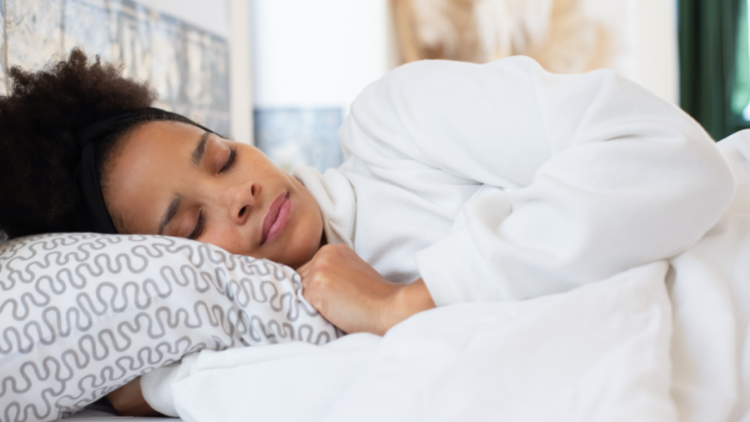What is Menopause Fatigue? | Everything You Need to Know

For many women before, during and after menopause, fatigue is an unwanted, ever present shadow clouding what could be active, vibrant days. Menopause fatigue, and lack of energy, is due to changing hormone levels, sleep disturbances and other issues and can affect a woman’s personality as well as her physicality. We believe in the unique and specific power of women and know that when women are at their best, their families, friends and communities can be at their best as well.
Who Suffers from Menopause Fatigue?
It is normal for women to feel overtired every now and then. Temporary disruptions in sleep usually come and go and women are usually able to recover well and get back to a normal sleep pattern.
However, persistent exhaustion can lasts longer, be more severe, and cannot be cured with rest. Women often feel completely drained and overtired to the point that it causes issues with focus, clarity and your overall quality of life. Fatigue at this level can make a huge impact on your emotional and psychological state.
Studies on menopausal symptoms show that there is a link between menopause and fatigue. In a cross-sectional study of 300 women, 85.3% of post-menopausal women and 46.5% of peri-menopausal women reported symptoms of physical and mental exhaustion compared to just 19.7% of the pre-menopausal women. (ncbi.nlm.nih.gov) Medical researchers have also linked early menopause to a condition called chronic fatigue syndrome (CFS), a condition that commonly affects women with menstrual disorders and endometriosis.Most women don’t experience CFS, but a majority do experience severe fatigue during menopause. The lack of sleep and constant battle to get consistent quality sleep might catch them off guard.

Causes of Menopause Fatigue
Women in perimenopause that are approaching menopause will have their hormone levels fluctuate dramatically, which causes the brain to wake up throughout the night, resulting in sleep disorders. Also, lower levels of progesterone make some women short-tempered and less able to relax.
But hormones aren’t the only thing that will keep women up at night. Other common symptoms of menopause like hot flashes and night sweats can also impact sleep quality.
There are changes in the brain that lead to hot flashes, and those changes — not just the feeling of heat — can also be what triggers the body to wake up while you’re trying to sleep. Even women who don’t report having sleep disturbances from hot flashes often say that they have more trouble sleeping than they did before menopause. According to the North American Menopause Society (NAMS) , hot flashes are the most common menopause-related discomfort and can last from 1 to 5 minutes. The more your body struggles with temperature regulation, the more likely you’ll wake up throughout the night. If you are not comfortable then you will not sleep well.
How Long Does Menopausal Fatigue Last?
According to medical experts, you can expect to experience menopausal fatigue and menopause symptoms over the duration of your menopausal transition. This can last ten years or more.
Menopausal transitions normally last about eight to ten years, but they can also go on for as much as 15 years.
Menopause Fatigue Remedies
The following 5 actions can help address menopause fatigue and help women feel like their GYNOMITE selves again.
1. GET MOVING
It’s a classic catch-22. We all know exercise boosts energy levels, but it is hard to get moving when you have none. Exercise not only increases energy, but also produces those feel-good hormones that seem to be eluding us these days. Aim for 30-60 minutes of exercise most days of the week.
Our tips:
Get yourself some exercise clothes you feel good in. Even if you have only one set of gear that you wash every night, it makes a big difference to be comfortable and feel confident when forming a new habit. Glamour Magazine compiled a nice list of resources for affordable workout gear.
Look for ways to dual-task. An hour walk can feel boring, but finding a great podcast or audiobook can turn your walk from something you dread to something you look forward to. A hike with a friend, in person or via phone, is a treat. Take turns choosing the route and terrain.
Lift weight. It may be your own body weight at first, but then move on to light hand weights. It used to be all about cardio, especially in the 80s, but as we mature, it becomes more important to build and retain muscle. A regular weight routine also protects bones. Here’s a beginner routine, and here is a more advanced one.
2. FEED YOURSELF RIGHT
You’ve heard this before: Say yes to fruits, vegetables, whole grains and lean proteins. Limit fats and sweets. It still holds true, but there are some nuances for women in or approaching menopause. Spicy foods can trigger hot flashes. Heavy meals can trigger heartburn. Smaller more frequent meals/snacks can sustain energy. In general, an anti-inflammatory diet can help with weight gain and vitality.
Our tips:
Keep it together during the week and cheat a little on the weekend. Over time, your tastes will change and you’ll find less interest in cheating.
Sometimes a girl needs a little help and meal delivery services can be great. We’ve dabbled with several different healthy meal delivery services to get back on track after holidays or to keep on track when we see a busy schedule in the forecast.
Soup is a terrific way to cook ahead, pack in nutrients, and always have something healthy in the fridge. Double your favorite recipes then freeze in smaller quantities for quick meals.
3. MONITOR ALCOHOL, CAFFEINE AND NICOTINE
The immediate boost feels great, but the net effect is often a drain, taking more out of you in the long run. Energy levels and mood can both be affected. Many women also find they cannot “handle” alcohol like they used to with either more dramatic swings during drinking or a harder time recovering. This phase of life is a good time to reevaluate your relationship to alcohol, caffeine and nicotine. You may decide to scale back in quantity, frequency or both. You may decide to stop all together.
Our tips:
Alcohol replacements have been popping up everywhere. Non-alcoholic spirits allow for creative cocktail making, and participation in the festive cocktail hour. Cut the alcohol in your drink with a non-alcoholic spirit, or replace it all together.
Cannabis drinks allow for the relaxation that you may be craving at the end of the day without the negative effects of alcohol. We are in California and love Wunder for their unique flavors, low calories and choice of THC level.
When you do drink alcohol, drink water alongside. At least one glass of water per drink. Two is better. This not only hydrates you as you go, it slows down your intake. If you do have too much alcohol and find yourself with a hangover, cannabis can help your day improve.

4. TEND TO YOUR SLEEP
If your ability to sleep is feeling compromised you aren’t alone. Falling asleep (sleep latency) is one issue (it should take 10-20 minutes). Staying asleep is another and getting back to sleep is yet a third. A relationship exists between hormone secretion and the sleep/wake cycle. Hormones also affect the body’s ability to regulate temperature and hormone fluctuation results in night sweats (and the subsequent chill once they subside). Hormone Replacement Therapy can definitely help, but not everyone is, or is comfortable being, a candidate. Experts recommend creating a sleep-supportive routine which includes going to bed and getting up in the morning at roughly the same times each day, even on weekends. Sleep in a cool room (65 degrees F). Avoid using screens before bed and provide yourself with the right pillows, sheets and sleepwear.
Our tips:
Sleep masks can really help relax your eyes for sleep. It’s ridiculously simple, but keeping your eyes shut can shorten sleep latency. Each time your eyes flutter open you are letting in light and giving your brain something to focus on. We like the Lunya sleep mask for its feather-weight and breathable fabric.
Sound Bath or Singing Bowls is a sound experience best attended live, but also helpful when listened to or recorded. In a sound bath, sound waves are produced by various sources, like gongs, singing bowls, percussion, chimes, and rattles. The music doesn’t have a melody or rhythm but instead is a carefully selected wash of instrument and voice with notable resonance to affect the brain with sound waves. We sometimes pop in our headphones and listen to ourselves to sleep.
Hello Again Sleep vaginal suppositories are providing women of all ages with a non-hormonal, plant-based sleep solution that helps women fall asleep, stay asleep, or go back to sleep when things go bump in the night. Our formula includes a soothing cocoa butter and avocado oil base, botanicals to support sleep, and cannabis. The vaginal delivery system allows for the use of cannabis, and 20mg of THC, without the typical psychoactive high. So why use cannabis? because the cannabinoids THC and CBD make use of your body’s endocannabinoid system to restore balance to your systems; including the sleep system.
5. STAY HYDRATED
About 55% of adult, female bodies are made of water. A good goal is to never feel thirsty as thirst is your body’s way of telling you that you need more fluid. Dehydration requires your body to work harder to perform even the most basic functions which can lead to fatigue. Dehydration can also cause nausea and difficulty concentrating. Choose water or caffeine-free tea or coffee and avoid sugary or high-calorie drinks.
Our tips:
Need to catch up on hydration? Parsley water is a fantastic, natural super hydrator and anti-inflammatory. Simmer 1 clean bunch of organic, Italian parsley in a pot of water for 3-5 minutes then close the flame and let it steep for another 30. Strain the leaves from the water and drink hot or cold. The water will keep in the fridge for several days.
Want to learn more? Read about Sleep Cycles.
-Carrie Mapes